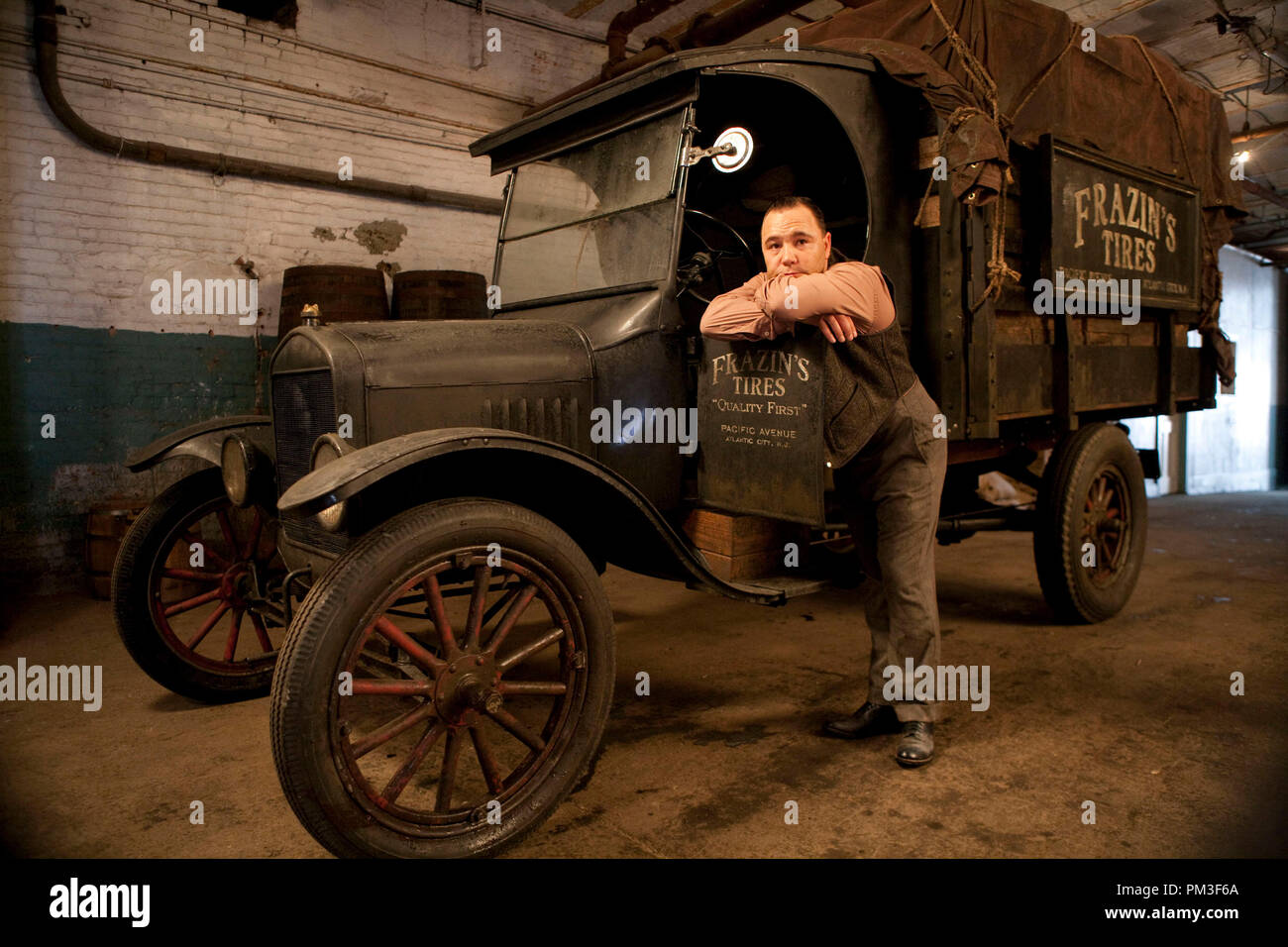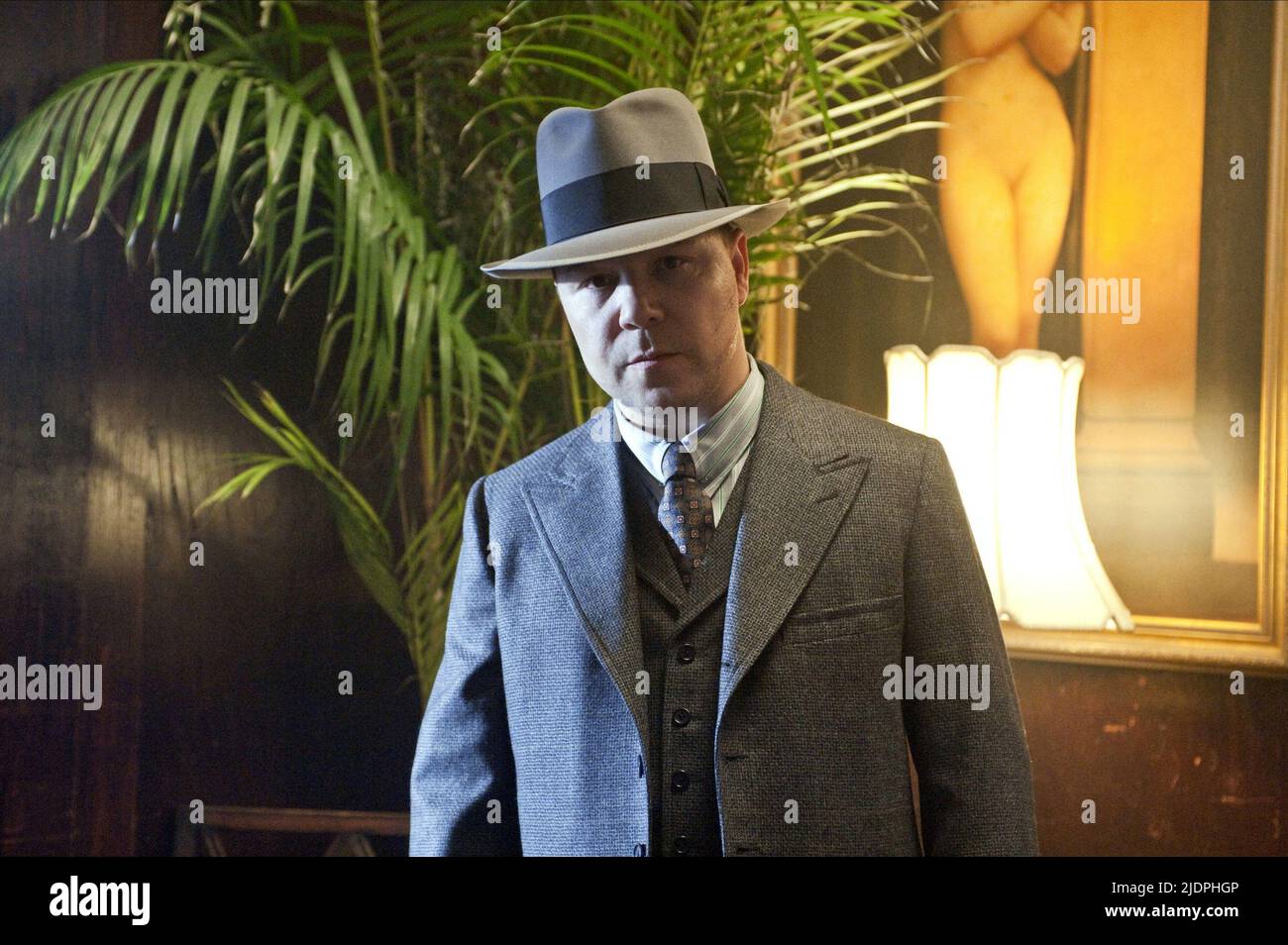When you think about the captivating world of Prohibition-era Atlantic City, one performance, in particular, really stands out: Stephen Graham's portrayal of the notorious Al Capone in HBO's hit series, Boardwalk Empire. It's almost as if he was born to play the part, bringing a raw, unpredictable energy that just grabs you from the very first scene. This isn't just acting; it's a complete transformation, showing us a side of the infamous gangster that was both terrifying and, in a way, oddly human.
The show itself painted a sprawling picture of crime, politics, and the murky beginnings of organized syndicates in America, and Graham's Capone was, very much, a vital part of that canvas. His character wasn't just a supporting player; he was a growing storm, someone whose presence truly shaped the story's direction, and that's quite something. You could argue, too, that his performance helped define the series' gritty, authentic feel, making it a favorite for many.
So, we're going to take a closer look at what made Stephen Graham's take on Al Capone so incredibly memorable. We'll explore how he brought this historical figure to life, the impact his acting had on the show, and why, even years later, his scenes still resonate with fans. It's a chance to appreciate a truly remarkable performance that, in some respects, left a lasting mark on television history.
Table of Contents
- A Glimpse into Stephen Graham's Journey
- The Unforgettable Al Capone in Boardwalk Empire
- Beyond the Fedora: Stephen Graham's Acting Genius
- Why Stephen Graham's Al Capone Still Resonates Today
- Frequently Asked Questions About Stephen Graham's Al Capone
A Glimpse into Stephen Graham's Journey
Stephen Graham is an English actor, someone who has, quite simply, become a household name thanks to his powerful and believable performances. Born in Kirkby, Merseyside, he began his acting career early, showing a natural talent for portraying complex characters. His path has been a fascinating one, marked by a dedication to his craft and a willingness to take on very different kinds of roles. It's interesting, too, that his first name, Stephen, derived from Greek, means "crown" or "garland," a name that in some respects signifies honor and achievement, which feels rather fitting for an actor who has truly made his mark.
Before his iconic turn in Boardwalk Empire, Graham had already built a strong reputation with roles in films like This Is England, where he played the intense Combo, and in Guy Ritchie's crime caper, Snatch. These early parts, as a matter of fact, showcased his ability to bring a certain gritty realism to his characters, preparing him, perhaps, for the larger-than-life figure of Al Capone. He's an actor who really disappears into his roles, making you forget you're watching someone perform.
His work has earned him a lot of praise, and he's widely regarded as one of the finest actors of his generation. He has a way of capturing the essence of a person, whether they're good or bad, with a depth that is, quite frankly, rare. This dedication to his characters is a big part of why he's so respected by both audiences and his fellow actors, and it's something that really shines through in all his projects.
Personal Details
| Full Name | Stephen Graham |
| Date of Birth | August 10, 1973 |
| Place of Birth | Kirkby, Merseyside, England |
| Nationality | British |
| Notable Roles (Selected) | Al Capone (Boardwalk Empire), Combo (This Is England), Tommy (Snatch), Anthony "Tony Pro" Provenzano (The Irishman), Det. Supt. Dave Roberts (Line of Duty) |
| Awards/Nominations | Numerous nominations, including BAFTA TV Awards and Screen Actors Guild Awards. |
The Unforgettable Al Capone in Boardwalk Empire
Stephen Graham's portrayal of Al Capone in Boardwalk Empire is, arguably, one of the show's most talked-about elements. From his first appearance as a young, ambitious enforcer in Chicago, you could tell he was going to be a force. He didn't just play Capone; he embodied him, capturing the man's volatile temper, his surprising loyalty, and his gradual descent into ruthless leadership. It was a performance that evolved right before our eyes, showing the growth of a legend.
The series, set in the 1920s and 30s, gave Graham a broad canvas to explore the many sides of Capone, from his early days working for Johnny Torrio to his eventual rise as Chicago's most feared crime boss. He managed to balance the historical accuracy with a compelling character study, making Capone feel like a real person, not just a caricature. This approach, in some respects, made his performance all the more chilling and authentic.
Fans of the show often point to Graham's Capone as a highlight, and it's easy to see why. His scenes were always charged with an unpredictable energy, keeping viewers on the edge of their seats. He brought a certain magnetism to the role, making even the most brutal moments feel incredibly real. This ability to command attention, very simply, made his character a standout.
Bringing a Legend to Life: Graham's Approach
Bringing a historical figure as famous as Al Capone to the screen is no small feat, but Stephen Graham tackled it with remarkable dedication. He apparently studied a lot about Capone, looking at old photographs, listening to recordings, and reading accounts of the man's life. This deep research helped him capture not just the look, but also the mannerisms and the unique way Capone carried himself, which is that kind of commitment you hope for in an actor.
What truly made his portrayal special was his ability to convey Capone's inner turmoil and the complexities beneath the violent exterior. He showed us moments of vulnerability, of anger, and even of twisted affection, making Capone more than just a one-dimensional villain. It was a performance that, in a way, explored the human cost of power and ambition, which is a very interesting angle.
He didn't shy away from Capone's brutality, but he also made sure to show the charm and charisma that allowed Capone to build his empire. This balance was, quite frankly, essential. Graham's performance served as a masterclass in character development, demonstrating how a true artist can bring historical figures to life with nuance and depth, and that's something to really appreciate.
Al Capone's Arc: From Enforcer to Boss
Throughout Boardwalk Empire, we witness Al Capone's journey from a relatively small-time enforcer to the undisputed king of Chicago's underworld. Stephen Graham perfectly charted this progression, showing Capone's increasing confidence and ruthlessness with each season. His early scenes showed a young man eager to prove himself, a bit hot-headed, but full of potential, and that was, very much, the beginning of something big.
As the series went on, Graham's Capone became more calculating, more strategic, but never lost that explosive edge that made him so dangerous. You could see the weight of his growing power in his eyes, the toll it took, and the way it changed him. He became, in a way, a symbol of the Prohibition era's dark side, a man forged by violence and ambition, and that's a powerful statement.
The transformation was gradual, yet totally believable, which is a testament to Graham's skill. He allowed the audience to understand, if not sympathize with, the forces that shaped Capone into the legend he became. This careful building of the character's arc was, quite simply, one of the most compelling aspects of his performance, and it really sticks with you.
The Chemistry with the Cast
A big part of what made Stephen Graham's Al Capone so effective was his interactions with the other characters in Boardwalk Empire. His scenes with Kelly Macdonald's Margaret, for example, were surprisingly tender and unsettling all at once. Then there were his explosive confrontations with Steve Buscemi's Nucky Thompson, which were always charged with tension and a kind of grim respect, too, between two powerful figures.
His dynamic with Johnny Torrio, played by Greg Antonacci, was also very interesting, showing the mentorship and eventual power struggle between them. Graham had a knack for making these relationships feel authentic, whether they were based on loyalty, fear, or a complex mix of both. This ability to play off his fellow actors really elevated every scene he was in, making the show feel more alive.
It's fair to say that Graham's performance didn't exist in a vacuum; it was enhanced by the strong ensemble cast around him. He brought out the best in his scene partners, and they, in turn, helped him flesh out the many facets of Al Capone. This collaborative spirit, quite frankly, is a hallmark of great television, and it really shows here.
Beyond the Fedora: Stephen Graham's Acting Genius
While his role as Al Capone is certainly iconic, Stephen Graham's career is full of equally impressive performances that show his incredible range and depth as an actor. He has a unique ability to disappear into a character, no matter how different they are from each other, which is something very few actors can truly achieve. It's like he completely transforms, and that's pretty amazing to watch.
From the troubled soldier in Band of Brothers to the intense detective in Line of Duty, Graham consistently delivers performances that are both raw and deeply nuanced. He has a way of conveying so much with just a look or a subtle gesture, making his characters feel incredibly real and complex. This attention to detail, too, is a big part of his appeal.
His work is a testament to his dedication and his genuine talent. He doesn't just play a part; he lives it, and that's why audiences connect so strongly with his characters. You can find more about his diverse filmography and other projects by searching for "Stephen Graham films" online, which will show you the breadth of his work.
His Signature Style and Versatility
Stephen Graham's acting style is often described as intense, authentic, and incredibly physical. He uses his whole body to convey emotion, and his eyes, very often, tell a whole story on their own. He has a knack for playing characters who are on the edge, often with a hidden vulnerability beneath a tough exterior, and that's a very compelling combination.
What's truly remarkable about him is his versatility. He can convincingly play a menacing gangster one moment and a kind-hearted, struggling father the next. This ability to switch gears so effortlessly is a mark of a truly gifted actor. He doesn't get typecast, which is, quite frankly, a huge accomplishment in the acting world, and that's something to admire.
His performances are never boring; they always feel fresh and unpredictable, keeping you engaged. He brings a certain truthfulness to every role, making even the most extreme characters feel grounded and believable. This commitment to honesty in his portrayals is, very simply, a defining characteristic of his work.
Critical Acclaim and Lasting Impact
Stephen Graham has received widespread critical acclaim throughout his career, earning numerous awards and nominations for his work. His performance in Boardwalk Empire, in particular, brought him significant international recognition and cemented his status as a top-tier actor. Critics often praise his intensity and his ability to inhabit complex roles with such conviction, and that's a big deal.
His impact extends beyond just awards; he has influenced a generation of actors with his raw, honest approach to performance. Many aspiring performers look to his work as an example of how to truly commit to a character and bring them to life. He has, in a way, set a very high bar for authenticity in acting, and that's a wonderful legacy to have.
Even today, his performances are discussed and analyzed in acting schools and by film enthusiasts. He has a lasting presence in the industry, and his contributions to television and film are, quite frankly, undeniable. His work reminds us of the power of truly great acting to shape stories and leave a lasting impression on audiences, and that's something special.
Why Stephen Graham's Al Capone Still Resonates Today
Years after Boardwalk Empire first aired, Stephen Graham's portrayal of Al Capone continues to captivate new viewers and remain a favorite for long-time fans. There's something about his performance that just sticks with you, a blend of menace and surprising humanity that few actors could achieve. It's a testament to his skill that the character feels as fresh and impactful now as he did when the show first premiered, and that's quite an achievement.
The character of Al Capone, as brought to life by Graham, represents a pivotal moment in American history, a time of great change and lawlessness. His performance captures the spirit of that era, making it feel tangible and real for audiences. He truly became the face of organized crime in the series, and that's a powerful thing.
His work on the show is often cited as one of the best portrayals of a historical figure in modern television. It's a performance that stands the test of time, continuing to draw people into the dark and compelling world of Boardwalk Empire. You can learn more about the show itself and its historical context by exploring its dedicated pages, perhaps starting with a general overview of Boardwalk Empire on Wikipedia.
A Performance for the Ages
What makes Stephen Graham's Al Capone a performance for the ages is its sheer depth and unpredictability. He didn't just play a gangster; he played a man who was, in some respects, a product of his environment, someone capable of both incredible cruelty and fleeting moments of tenderness. This duality is what makes the character so compelling, and that's very difficult to pull off.
Every scene he was in felt charged, like anything could happen, and that kept viewers glued to their screens. He had a way of commanding attention without needing to shout, though his outbursts were, quite frankly, legendary. It's the kind of performance that makes you think about the character long after the credits roll, and that's a sign of true artistry.
His portrayal is often held up as an example of how to bring a historical figure to life with both accuracy and dramatic flair. It's a masterclass in character acting, showing how dedication and talent can create something truly unforgettable. This kind of work, very simply, leaves a lasting impression on the audience.
The Show's Enduring Legacy
Stephen Graham's Al Capone is, without a doubt, a significant part of Boardwalk Empire's enduring legacy. The show itself is celebrated for its intricate storytelling, stunning visuals, and incredible cast, but Graham's contribution stands out as a particular highlight. His character's journey mirrored the show's own rise and fall, making him an integral part of its narrative fabric.
The series, as a whole, continues to be discovered by new audiences, and Graham's performance is often one of the first things they praise. It's a powerful example of how a supporting role can, in a way, become just as iconic as the main characters, sometimes even more so. This kind of impact is rare, and it speaks volumes about his talent.
His work on Boardwalk Empire remains a benchmark for historical drama. It showcases how a brilliant actor can elevate an already strong production, creating something truly special that resonates for years to come. You can learn more about the world of historical dramas on our site, and link to this page for a detailed review of Boardwalk Empire.
Frequently Asked Questions About Stephen Graham's Al Capone
Here are some common questions people have about Stephen Graham's unforgettable role as Al Capone.
Who played Al Capone in Boardwalk Empire?
The iconic role of Al Capone in HBO's Boardwalk Empire was brought to life by the incredibly talented English actor, Stephen Graham. He portrayed Capone from his early days as a Chicago enforcer through his rise to becoming a powerful crime boss. His performance, very simply, is one of the show's most memorable elements.
How accurate was Stephen Graham's Al Capone?
Stephen Graham's portrayal of Al Capone was generally praised for its historical accuracy, especially concerning Capone's volatile personality and his distinctive mannerisms. While some dramatic liberties were taken for the sake of the story, Graham's deep research and commitment to the role ensured a very believable and, in a way, true-to-life depiction of the infamous gangster.
What other notable shows has Stephen Graham been in?
Beyond his famous role as Al Capone, Stephen Graham has had many other significant roles in popular television shows. Some of his most acclaimed performances include playing Combo in This Is England, Detective Superintendent Dave Roberts in Line of Duty, and John Corbett in Line of Duty as well. He also appeared in the miniseries The Virtues, showcasing his wide range.



Detail Author:
- Name : Dr. Audrey Brekke
- Username : roscoe.runolfsson
- Email : octavia.yundt@schmidt.com
- Birthdate : 1994-12-16
- Address : 3358 Euna Ramp Suite 993 Alanville, PA 45998
- Phone : 623-371-4995
- Company : Walsh Group
- Job : Chemical Technician
- Bio : Qui id laudantium qui molestiae neque natus doloremque. Quia amet eum aperiam. Qui iusto optio libero recusandae quis ipsa. Culpa accusamus quisquam minus perspiciatis.
Socials
linkedin:
- url : https://linkedin.com/in/madge_christiansen
- username : madge_christiansen
- bio : Laborum ab voluptatem et et.
- followers : 5382
- following : 2480
twitter:
- url : https://twitter.com/madge2031
- username : madge2031
- bio : Perspiciatis veniam rem modi numquam consequuntur dolore minus. At sapiente ut eaque beatae. Possimus rerum harum quos.
- followers : 1410
- following : 815

